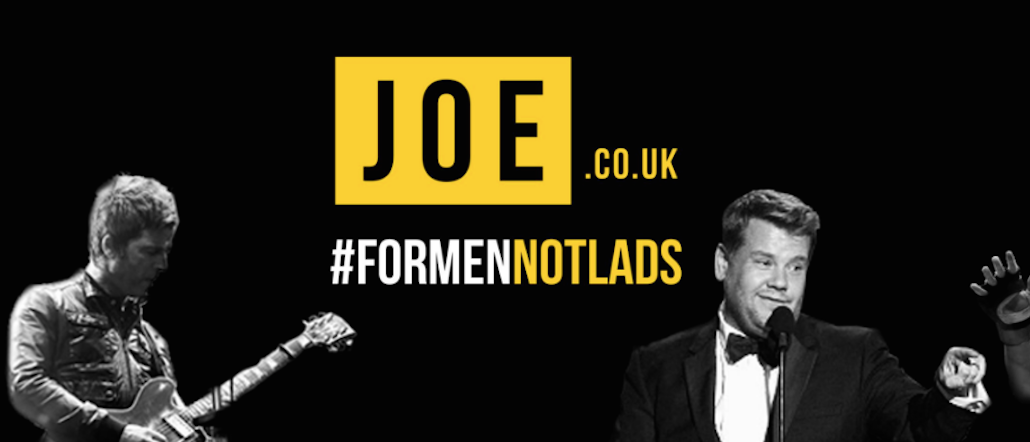Secure your place at the Digiday Publishing Summit in Vail, March 23-25

Joe Media, the self-proclaimed digital-first publisher for men, not lads, has been on a hiring frenzy lately, and it plans to double its headcount to 60 in the next six months.
In addition to hiring seasoned sports journalists from national brands like the Times and the Daily Mirror to bolster its editorial output, the publisher has also taken on James Wigley, formerly commercial director at Lad Bible. It also poached two former BuzzFeed employees: Louise Emmerson to head up brand partnerships and Alex Finnis as deputy editor. They join a number of other BuzzFeed vets who have joined the publisher, including current CEO Will Hayward.
Joe Media, originally from Ireland, has been in the U.K. for nearly a year and has grown to over 3.5 million online uniques according to comScore (internal Google Analytics are 5.5 million). Now, as Hayward explains, the focus is on distributed video.
“Video is really important, and on distributed platforms, video is more important because the likes of Facebook and Snapchat are leaning into it. For our journalism, we’re as committed to the written word as we want to be with video.”
Digiday caught up with Hayward to talk about the publisher’s video plans.

Talk us through some of the changes going on at Joe Media.
So far, really successful high-production value videos on Facebook are TV shows recorded for Facebook. Things like Carpool Karaoke, Lip Sync Battles, Channel 4 are also doing some great work; the high-quality content is coming from TV networks. Our bet is in 12 months we’ll see a shift in premium content coming from digital publishers. We don’t believe Joe is a website; it’s a premium-content network that covers things men are interested in like sport, style, humor, entertainment and health. We have an original high-production series coming in the next few weeks: a weekly 30-minute show with talent live on Facebook rather than broadcast on Channel 4, for example.
Care to elaborate?
One teaser is we’ll be creating fitness content, which ties in with a lot of what we cover around fitness, health and nutrition. We’re building our London studio, and it will take a month to fully get off the ground.
What’s been your video output so far?
We’ve done a lot of Facebook Live experiments, which we really enjoy. They have a low-production value, and we play with the direct interaction with the audience. We’ve challenged viewers to find which pub we were in; it was a treasure hunt built for Facebook Live. Yesterday, we had the World Champion football freestyler in the office and the audience challenged him to do tricks.
So people are done watching the short, made-for-Facebook videos?
It’s the maturation of social video. The challenge is, people spend only one and a half minutes watching video on social. If they want to watch something longer, they’ll do it on Netflix. That’s more of a challenge of the content that is being put out there rather than the nature of watching via mobile or Facebook. That’s why we’re investing here.
What’s your view on the competition?
The pie is expanding. But there is a clear difference between those investing heavily in content and those building big global equivalents of “You’ve Been Framed.” There are even more publishers hoovering up user-generated content or viral videos and distributing to big global audiences. There’s an appetite for that, but there’s not an appetite for brands to be associated with it. In the age of distributed media, half of value for the brand is the type of audience, not just the reach.
So how will you monetize this?
We’re more interested in brands sponsoring specific shows. We do some branded content, but we’re moving to the model of creating great shows that are sponsored by brands, and the audience explicitly knows that, even if the brands is not directly involved in the creation.
How else will the team be changing?
The lean is toward editorial, but we’re also driven by the commercial strategy because advertising targeted at men could do so much better. Like Keith Weed [Unilever CMO] said in Cannes, we have a moral responsibility to unstereotype ads, so you don’t just have the hot woman and the dumb man. This has driven results for Unilever. Most media businesses have their moral obligations manifested in editorial drive; ours is through editorial and commercial, so we neither objectify women nor talk down to men.
Hear more from Will Hayward who is speaking at Digiday’s Publishing Summit Europe this October in Nice, France.
Image courtesy of Joe Media.
More in Media

Media Briefing: As AI search grows, a cottage industry of GEO vendors is booming
A wave of new GEO vendors promises improving visibility in AI-generated search, though some question how effective the services really are.

‘Not a big part of the work’: Meta’s LLM bet has yet to touch its core ads business
Meta knows LLMs could transform its ads business. Getting there is another matter.

How creator talent agencies are evolving into multi-platform operators
The legacy agency model is being re-built from the ground up to better serve the maturing creator economy – here’s what that looks like.





